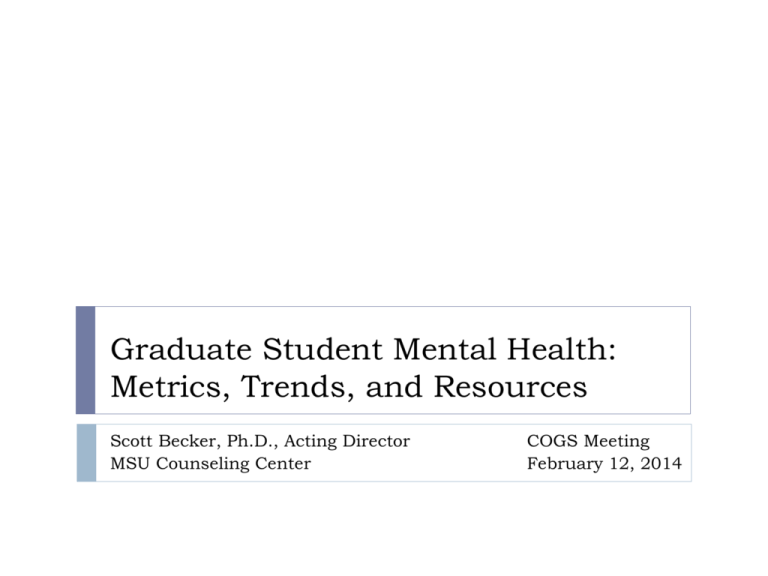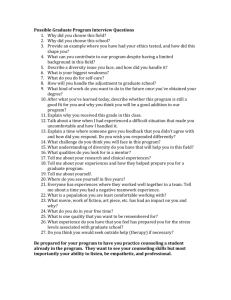Graduate Student Mental Health: Metrics, Trends, and Resources
advertisement

Graduate Student Mental Health: Metrics, Trends, and Resources Scott Becker, Ph.D., Acting Director MSU Counseling Center COGS Meeting February 12, 2014 Overview Graduate Student Mental Health Metrics Surveys (NCHA, Big 10, Berkeley) MSUCC data Trends Increased prevalence Increased acuity Impact of technology Resources and Proposed Actions Clinical and wellness resources Proposed actions Graduate Student Mental Health METRICS: 2012 NCHA SURVEY Source: 2012 National College Health Assessment (NCHA) Sorted by Allyson Rogers, MA, Olin Health Center Sense of Loneliness: 43% Total Ever felt lonely: Overall Percent % No, never 26.0 No, not in last 12 months 30.8 Yes, in the last 2 weeks 19.1 Yes, in the last 30 days 7.2 Yes, in the last 12 months Total NCHA, 2012 - MSU Graduate Students 16.9 100.0 Anxiety Symptoms: 44% Total Ever felt overwhelming anxiety: Overall Percent % No, never 33.4 No, not in last 12 months 22.2 Yes, in the last 2 weeks 14.9 Yes, in the last 30 days 8.8 Yes, in the last 12 months Total NCHA, 2012 - MSU Graduate Students 20.7 100.0 Sense of being Overwhelmed: 88% Total Ever felt overwhelmed: No, never No, not in last 12 months Yes, in the last 2 weeks Yes, in the last 30 days Yes, in the last 12 months Total Overall Percent % Int’l Student 11.5 21.1 Non Int’l Student 6.8 8.6 16.6 5.2 45.3 31.5 51.4 13.6 13.1 14.2 21.0 17.7 22.4 100.0 100.0 100.0 NCHA, 2012 - MSU Graduate Students Depression: 32% Total Ever felt so depressed it was difficult to function: Overall Percent % No, never 46.4 No, not in last 12 months 21.8 Yes, in the last 2 weeks 11.5 Yes, in the last 30 days 5.1 Yes, in the last 12 months Total NCHA, 2012 - MSU Graduate Students 15.3 100.0 Suicidal Ideation: 5% Total Ever seriously considered: Overall Percent % No, never 80.5 No, not in last 12 months 14.5 Yes, in the last 2 weeks 0.3 Yes, in the last 30 days 1.0 Yes, in the last 12 months 3.7 Total NCHA, 2012, MSU Graduate Students 100.0 Suicidal Ideation: Other Studies • Big Ten Student Suicide Study 10-year analysis of 261 suicides at 12 Midwestern universities from 1980 to 1990 graduate students were at greater risk for suicide than undergraduate students • Berkeley Graduate Student Mental Health Survey 45 percent experienced “an emotional or stress-related problem that significantly affected their well being and/or academic performance” 10 percent “seriously considered suicide” Nearly 25 percent didn’t know about the university’s mental health services (even fewer international students) Female students “were more likely to report feeling hopeless, exhausted, sad, or depressed” Insomnia: 3% Total Last 12 months diagnosed/treated: Overall Percent % No 97.2 Yes, diagnosed but not treated 0.7 Yes, treated with medication 0.7 Yes, treated with psychotherapy Yes, treated with medication & psychotherapy 0.7 Total NCHA, 2012 - MSU Graduate Students 0.7 100.0 Other Sleep Disorders: 4% Total Last 12 months diagnosed/treated: Overall Percent % No 96.7 Yes, diagnosed but not treated 0.7 Yes, treated with medication 0.6 Yes, treated with psychotherapy Yes, treated with medication & psychotherapy 0.4 Yes, other treatment 1.4 Total NCHA, 2012 - MSU Graduate Students 0.4 100.0 Diagnosed with Anxiety: 12% Total Last 12 months diagnosed/treated, anxiety: Overall Percent % No 87.5 Yes, diagnosed but not treated 2.4 Yes, treated with medication 5.8 Yes, treated with psychotherapy Yes, treated with medication & psychotherapy 1.4 Yes, other treatment 0.8 Total NCHA, 2012 - MSU Graduate Students 2.1 100.0 Diagnosed with Depression: 11% Total Last 12 months diagnosed/treated, depression: Overall Percent % No 88.6 Yes, diagnosed but not treated 1.9 Yes, treated with medication 4.4 Yes, treated with psychotherapy 2.4 Yes, treated with medication & psychotherapy 2.4 Yes, other treatment 0.3 Total NCHA, 2012 - MSU Graduate Students 100.0 History of Depression: 19% Total Ever diagnosed with depression: % Yes % No Overall 19.1 80.9 International student Non-International student 10.0 90.0 23.4* 76.6 *U.S. Students more than twice as likely to have a history of diagnosed depression NCHA, 2012 - MSU Graduate Students Stress Level: 12% Report “Tremendous Stress” 57% Report “More than Average Stress” During Last 12 months: Overall % White % Other % 1.0 0.6 1.5 Less than average stress 12.9 6.3 21.3 Average stress 29.0 30.0 27.7 More than average stress Tremendous stress Total 44.6 47.8 40.7 12.4 15.3 8.8 100.0 100.0 100.0 No stress NCHA, 2012 - MSU Graduate Students Graduate Student Mental Health METRICS: MSU COUNSELING CENTER DATA Source: MSUCC 2012-2013 Annual Report Graduate/Professional Students at MSUCC Junior 18% Senior 19% Sophomore 23% First-year 23% MSUCC 2012-2013 Annual Report <No Response> 1% Graduate / professional 15% (426) Non-student 0% Non-degree student 0% Other 1% Graduate/Professional Students at MSUCC: International Status United States 289 (68%) 48 Countries of Origin International: 137 (32% of 426) Top 5 Countries of Origin Country of Origin # Grad/Prof. Clients China 21 % of Intl. Grad/Prof. Clients 15% Korea 11 8% Iran 10 7% India 9 7% Saudi Arabia 7 5% % of Clients* by Diagnostic Clusters Psychosis Mania Bereavement ADHD Developmental Eating Disorder Substance Abuse Relational Panic Trauma Academics Anxiety Depression 0 10 20 30 40 *Total numbers for graduate and undergraduate students 50 60 70 National Prevalence in UCCs Compared to MSUCC Condition Anxiety Depression Relationship issues Psychotropic medication Suicidal thoughts Significant prior treatment Alcohol abuse/dependence ADHD Sexual/physical assault Self-injurious behavior Eating disorders Oppression (racism, sexism, homophobia) Source: AUCCCD survey, 2012 National 42 36 36 24 16 14 10 9 9 9 6 6 MSUCC 58 61 25 28 36 23 20 8 17 15 11 9 % Diff. +16 +25 -11 +4 +20 +9 +10 -1 +8 +6 +5 +3 Academic Performance and Retention Negative Impact of Mental Health issues: At initial assessment, 53% (960 students) report that their presenting mental-health concerns were negatively impacting their academic performance. At initial assessment, 12% (290 students) report that they had strongly considered leaving school as a result of their mental-health issues. Source: MSU Counseling Center Annual Report, 2012-2013 Academic Performance and Retention: Positive impact of counseling/psychotherapy: In an outcome survey, 62% (616 students) report that their services at MSUCC improved their academic performance. In an outcome survey, 46% (457 students) report that their services helped them remain enrolled at MSU. Source: MSU Counseling Center Annual Report, 2012-2013 Graduate Student Mental Health TRENDS: NATIONAL DATA Increased Acuity: Paradigm Shift in University Mental Health National Trends Increased acuity of presenting concerns at university counseling centers: Prevalence of severe psychological disorders has nearly tripled Increase in high-risk behaviors such as harm to self and others Increase in psychiatric medication Increase in hospitalizations Increased demand for services was reported by 93% of university counseling center directors (AUCCD, 2012) Staff of UCCs have, on average, not grown in the past 15 years MSUCC: increase of 76% in students seen in direct service from 2006-2012 Possible Explanations Availability of mental health treatment for children and adolescents Socioeconomic stressors Collective/cultural anxiety Financial stressors due to parental unemployment Competition for grades, internships, jobs postgraduation 9/11 Virginia Tech, etc. Recognition and reporting of trauma, including childhood sexual abuse and sexual assault De-stigmatizing of mental health treatment; increased help-seeking Social media and the over-use of recreational technology Technology and Mental Health “This is an issue as important and unprecedented as climate change.” --Susan Greenfield, Prof. of Pharmacology, Oxford U. Increased Media Exposure Sleep Attention, Memory, and Learning Anxiety and OCD Addiction Depression Emotion Regulation Identity and Relationships Narcissism and Empathy Technology and the Brain “…the brain is substantially shaped by what we do to it. When I say ‘shaped’, I'm not talking figuratively or metaphorically; I'm talking literally. At a microcellular level, the infinitely complex network of nerve cells that make up the constituent parts of the brain actually change in response to certain experiences and stimuli. The brain, in other words, is malleable - not just in early childhood but right up to early adulthood, and, in certain instances, beyond.” Susan Greenfield, Professor of Pharmacology, Oxford University http://podcasts.ox.ac.uk/does-mind-have-future-audio Graduate Student Mental Health RESOURCES & PROPOSED ACTIONS Resources Counseling Center Student Health Services at Olin Graduate Student Wellness Employee Assistance Program Mental Health Professionals affiliated with Professional Schools (e.g., CHM and Vet Med) Residence Education Neighborhood Clinics Office for International Students and Scholars Community Mental Health Off-campus providers Psychological Clinic Couple and Family Therapy Clinic Fee Hall Psychiatry Proposed Actions Survey of faculty and administrators regarding student mental health Disruptive behaviors Distressed and high-risk behaviors Safety concerns Drain on productivity MSUCC study of academic performance and retention Increased mental health consultation and crisis intervention Counseling Center Liaisons to Colleges and Departments CARES meetings in academic departments Counselors-in-Residence in the Neighborhoods Increased mental-health gatekeeper training with advisors and faculty Additional MSUCC Data Note: all data includes undergraduate and graduate students Gender Identity Female 59% Male 41% Self-Identified <1% Transgender <1% Racial Identity AfricanAmerican / Black 11% White 72% American Indian or Alaskan Native <1% Asian-American / Asian 8% Multi-Racial 4% Hawaiian or Pacific Islander <1% Latino/a 5% 53% (960) Report Mental Health Had Negative Impact on Academic Performance No impact 31% Unchecked 16% Negative impact 960 (53%) 12% (290) Considered Leaving School Due to Mental Health Did not consider leaving school 88% Considered leaving school 12% 8% (183) Presented in Crisis at Initial Appointment Not Crisis Presentation 92% Crisis Presentation 8% 26% (606) Report a History of Traumatic Experiences No trauma history 60% Trauma history: 26% No response 14% 17% (424) Report History of Unwanted Sexual Experience/Assault No Previous Unwanted Sexual Experience 78% 1 time 10% <No Response> 5% 2-3 times 4% > 5 times 2% 4-5 times 1% 23% (564) Report at Least One Prior Psychiatric Hospitalization Never 73% 1 time 12% <No Response> 4% > 5 times 1% 4-5 times 2% 2-3 times 8% 28% Prescribed Psychiatric Medication No psychiatric medication 72% Psychiatric medication 28%






